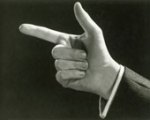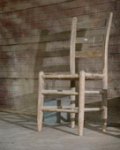I don’t always know what to do with my hands.
You might find that ironic for an actor, even more so for an educator. But, it’s still the truth.

Bang, bang, you shot me down.
It wasn’t anything I ever really noticed until a few years ago. I began to realize that my Nana was fascinated by the frequency with which I used my hands to animate my conversation. She would look less at me and more at my gesturing.
Over time, I became so concerned with how I might physcially be telling my story that I began to grow flustered at the dinner table. I didn’t know how not to use my hands.
As is my way and tendency, I began to obsess over excessive hand usage soon after.
It was a quiet thing, this staring that Nana did (does; I still struggle with it) to my hands, and, as you might have guessed, it has now become a habit of my own: to notice how often people use their hands to exemplify their points, even when it’s not necessary.
Like, the man at the four-way stop, yesterday, who flipped me off. (Although I suppose one could argue that that is necessary. But, I would have to counter with, No, it isn’t. No one ever gets the Four-Way Stop Rule, right, anymore. And on top of that, it’s actually a five-way stop. That’s right, a five-way stop).
For Nana, gentlemen didn’t need to use their hands for support. Their word was strong enough. I think she sees it as a sign of weakness, perhaps, that succeeding generations need more and more stimuli to keep them engaged. That’s a point to consider, indeed, but for some of us, it’s just a natural extension of our physical selves to use our appendages for emphasis.
She’s a picture of Victorian essence, though, and that I respect.
Even if her essence has made me somewhat self-conscious, and thus, critical.
We often hold others accountable for what we fail at ourselves, don’t we? I can’t not think less of someone who does that very thing I do, that I don’t like in myself. At least, not initially.
All this and over hands. Silly, huh?
But, not a new idea. I’m sure there are other Nanas the world over who carry such social concerns, tucked right beneath the handkerchief kept so tightly under their wristwatch bands or heirloom bracelets.
The problem for me, ultimately, is in finding something else for them to do, when I talk, if gesturing is a weakness in men. It’s like I’ve given my hands permission to think for themselves, and that, believe you me, gets me in more trouble than I can safely admit to here.
It doesn’t have to be a significant form of trouble either (or even have to involve anyone else). What it does, though, is divide my thinking, and sometimes with less than desirable results. Today, I went home, for example, to eat lunch. I stood in the kitchen scraping out the last of that delicious olive tapenade that Amanda made for the party last night, with a cut-up tomato, fresh from the garden, and I decided to do something I rarely do.

This is the lost shaker of salt.
I decided to add salt. (If you’re going to add salt, though, it is perfectly acceptable to do so with either a slice of tomato or a piece of watermelon).
I reached, without thinking, for the white salt shaker that was sitting on top of the microwave, with a fleeting realization that that, of all the available counter space in the kitchen, was an odd place to put the white salt shaker. All the same, I brought it over to the sink and raising it above my delectable slice of tomato, I shook some salt onto it.
No salt came out.
I shook it again. Still, nothing.
I was getting more and more irritated when I realized two very important things: 1) We don’t have a white salt shaker, and 2) it was, instead, the plastic insert that goes in the bottom of the food processor, which had been washed and was sitting in the drain beside the sink, drying.
Stupid hands. Just making assumptions, and in my own kitchen. (Of course, why the insert was sitting on top of the microwave – oh, never mind).
The fools. My hands.
Maybe I’m just too dramatic. The length of a finger, the crack of a knuckle, the ability to point, to wave, to applaud. I guess I can’t just look at a hand as a hand, I mean, not to see it as a hand…I look at it and I see the ability to know God a little closer (not just through prayer, but through creation).
I can build worlds with these hands using nothing but twenty-six letters. And judging by the sore spot on my thumb, I can also attempt to construct a 8×8 foot flat, down at the theater.
Aren’t hands often the first to show signs of age? If so, then, well, why not? Building worlds take a lot out of a person. Mine, for instance, are growing chafed and calloused. I look at them, right this second, for instance, as they skate over the keyboard, and I’m a little sad but mostly impressed. What these hands have done. The good and the bad…it’s still impressive. (Take a look at your own, and you’ll see your own history…read it and memorize it).
Because hands can do everything but lie.
After my first class, this morning, I sat in the lounge and flipped through the rest of the textbook. We’re about to begin our abbreviated, quick-speed run-through of fiction this week. I wasn’t sure, still not, of which stories I want to focus on. Welty, O’Connor, Faulkner, Wright, those are the usuals, but maybe I could find something new?
I merely turned one page, at that point, and there, on that page, lay a story I’d not only never read, but never heard of: “Hands” by Sherwood Anderson. Can you beat that?
So, I thought, well, hands aren’t perhaps a normal topic of conversation or blogging, unless you eat dinner at Nana’s on Sundays – let’s see what it’s about. Let’s read this story.
I was immediately struck by this unique and at first glance, blandly written piece of short fiction. Not the least of which was it’s not-so-subtle homosexual overtones, especially for something written in the 1910s. Admittedly, I’m not that familiar with Anderson’s thematic oeuvre but I was compelled by his fictional design in this particular story.
How sad the life of Wing Biddlebaum was. How misunderstood; note: due to an unfortunate incident, allegedly, with younger boys at the school where he used to teach, he was forced out of town and had to change his name.
Here, read this:
Wing Biddlebaum talked much with his hands. The slender expressive fingers, forever active, forever striving to conceal themselves in his pockets or behind his back, came forth and became the piston rods of his machinery of expression.
The story of Wing Biddlebaum is a story of hands. Their restless activity, like unto the beating of the wings of an imprisoned bird, had given him his name. Some obscure poet of the town had thought of it. The hands alarmed their owner. He wanted to keep them hidden away and looked with amazement at the quiet inexpressive hands of other men who worked beside him in the fields, or passed, driving sleepy teams on country roads.
His hands “alarmed their owner.” That’s bizarre and captivating to me. After you read the story, you’ll see why for yourself. He hides behind his hands and tries to manipulate them into the working class definition of “manual” labor of the other men in this town. He succeeds too well, you might say.

This will make sense after you read the story.
Another captivation: several times throughout the story, Anderson keeps stalling, suggesting that the “truth” of this story can’t be told except by a poet. A poet that Anderson refers to several times throughout the piece. And not just any poet, an obscure one.
To me, this is the beauty of the contrast.
Obscurity has no use for hands. A poet doesn’t either. All he needs is “an eye.” The difference is that truth exists in two forms: exposed for the eye to see, or through sleight of hand. The deceit of Wing’s lavish use of his hands is nothing short of a subconscious effort to trick the eye. Watch his hands and you never see the desperation that is in his face. The worry that drains him of “place” and “home.”
I mean for godsakes, re-read the first paragraph, again. He lives in a dilapadating house on the edge of a ravine. He’s headed for a meltdown, and one that’s been boiling for the last twenty years.
Talk about a slow burn.
Sigh.
I just hope that’s not what Nana sees when she looks at me.
Guess I better scratch gloves off my Christmas list.









